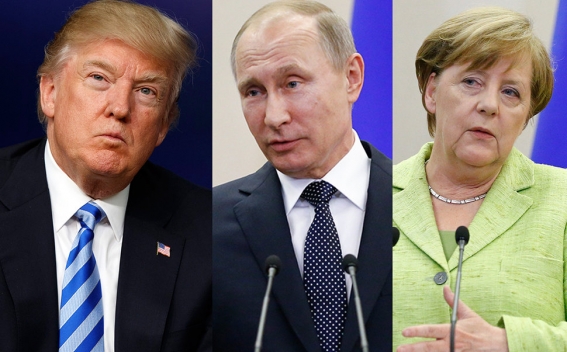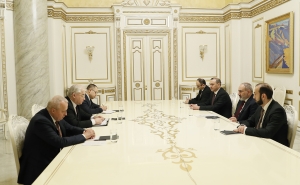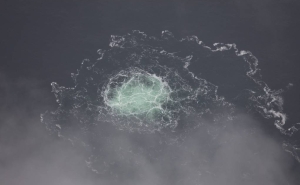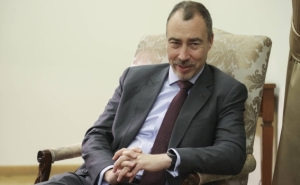Where Do the Interests of Germany, Russia and the US Meet?

Last week the US Senate with the votes, 97 for and 2 against confirmed the change to include sanctions against Russia in the bill that presupposes sanctions against Iran. It was expected that this week, the bill should be voted also by the US Congress House of Representatives, after which it should be confirmed by the US president. However, because of the disagreements on the issue between the Republicans and Democrats, the voting of the bill, will probably be postponed.
It is worth noting, that after the confirmation of the change in the bill by the US Senate, Germany’s Foreign Minister Sigmar Gabriel and Austria’s Federal Chancellor Christian Kern issued a joint statement, in which they criticized the decision of the US Senate noting that those sanctions contradict the economic interests of the EU and they will hinder the participation of European companies in the "Nord Stream 2" gas pipeline project.
In case the US confirms the sanctions against the RF in the end, can it become a reason for another tension between the US and its European allies?
The question is not that easy, as it may seem at first glance, as the interests of different players collide on the issue. First of all we should note that in contrast to the US Senate, the US President Donald Trump and his team posited against the sanctions. After the approval of the sanctions by the US Senate, the White House stated that they would work with the Republican congressmen in the House of Representatives, to ease the sanctions against the RF as much as possible. As the US State Secretary Rex Tillerson noted, the sanctions would have a negative impact on the US attempts to improve the relations with Russia.
On the other hand, we should state that it seems there are also some disagreements in the positions of the separate EU states and the official Brussels on the "Nord Stream-2" project. When, for example, Germany and Austria expressed their concerns about the US possible sanctions against Russia conditioning it by the negative impact it could have on the project "Nord Stream-2", the official Brussels, particularly the President of the European Council, Donald Tusk, stated that the construction of the project "Nord Stream-2" contradicted the EU legislation. In the letter addressed to the European Commission, he noted that the project would not serve the EU interests and will leave Ukraine "at the mercy of Russia." He called to review the terms of the project. To note such a stance from Germany and Austria is not occasional as those sanctions will hinder the work of German and Austrian companies, which have invested in the "Nord Stream-2" project.
It should be noted that the project "Nord Stream-2" will pass through the Baltic Sea taking gas from Russia directly to Germany thus bypassing Ukraine. Nine EU states - Croatia, the Czech Republic, Estonia, Hungary, Latvia, Lithuania, Poland, Slovakia and Romania, in their letter addressed to the head of the European Commission Jean-Claude Juncker, expressed their concern about the "Nord Stream-2" project saying that it would increase the EU’s dependence on Russia, Financial Times reports.
What refers to the position of Trump’s administration on the project "Nord Stream-2", it cannot be considered an absolute one as well. Germany and Austria that are interested in the project "Nord Stream-2", blame the US for interfering the Europe’s internal affairs. According to the existing viewpoint, the US tries to hinder the export of the Russian gas to Europe, in order its European allies use the gas exported from the US instead.
However, one can come to the question: what is more preferable for Trump’s administration – the deterioration of the relations with Russia followed by the sanctions against Russia or the profit get from the US gas exported to Europe. Judging from the foreign policy of Trump’s administration, demonstrated so far (they prefer concrete agreements reached with individual states, based on mutual interests), we cannot exclude that in the end RF, USA and the EU member states (Germany and Austria) interested in the project will reach an agreement on the project "Nord Stream-2" based on mutual interests.
Other materials on this subject
- Turkey is sending Cold War-era cluster bombs to Ukraine – FP The weapons are designed to destroy tanks by bursting into smaller submunitions, which can linger on the battlefield for years if they do not immediately explode. Each round scatters about 88 bomblets.
- Los Angeles mayor and city council president address US president on Lachin corridor issue Thank you, Mayor Bass, for joining me in communicating to President Biden the urgent need for U.S. leadership to lift the blockade and bring humanitarian relief to the people of Artsakh.
- US Committed to Helping Armenia and Azerbaijan Resolve Issues Peacefully: Blinken Spoke With Pashinyan The Secretary reiterated our commitment to helping Armenia and Azerbaijan resolve issues peacefully.
- Iran to Submit Final Conclusion Over Nuclear Deal Revival by Midnight In comments on Monday, Amirabdollahian said Iran is going to send its final conclusion about the JCPOA talks to the European coordinator in written form at midnight.
- Erdogan, Biden Might Meet in September- Media Turkey plans to buy 40 F-16 fighter jets from the US and upgrade another eighty. US President Joe Biden stated that he expects to receive the approval of the [US] Congress to sell F-16 fighter jets to...
Other materials on this subject
- The European Union Has Decided to Abandon Russian Coal In the Summer Many countries have joined these sanctions, even if this necessarily implies economic costs for ourselves," he noted.
- Germany Faces Steep Recession if Russian Oil and Gas Halted, Bank Lobby Says "The situation would be even worse if imports or supplies of Russian oil and natural gas were to be halted. A significant recession in Germany would then be virtually unavoidable," Sewing told journalists.
- EU Leaders Agree on Joint Gas Purchases Last year, the European Commission proposed to the EU countries a system of joint purchases of strategic gas reserves as a way to provide a buffer against possible supply disruptions. Fears of supply disruptions...
- European Union Launches “Team Europe” Package to Support Partner Countries with More than €20 Billion: Reuters Most of the money is being reallocated from other, less urgent EU foreign aid schemes in the EU’s common budget, but Borrell said the European Investment Bank, the European Bank for Reconstruction and...
- The Guardian: EU Leaders Clash Over Economic Response to Coronavirus Crisis Meeting via a video link, the EU’s 27 leaders papered over deep divisions by agreeing that another fortnight was needed to discuss ambitious economic recovery plans. After a testy debate over "coronabonds",...
-
 17:08
17:08The regular session of the Anti-corruption Policy Council takes place in Jermuk
-
 15:05
15:05The Prime Minister sends congratulatory messages to the supreme leader of Iran and the President of Iran
-
 11:11
11:11Armenia sends earthquake aid to Turkey
-
 10:43
10:43Commemoration of the Pontiff St. Sahak Partev
-
 09:16
09:16Some roads are closed and difficult to pass in Armenia
-
 19:55
19:55Phone conversation of the Foreign Minister of Armenia with the U.S. Assistant Secretary of State for European and Eurasian Affairs
-
 18:30
18:30Prime Minister Pashinyan and President Khachaturyan meet
-
 18:20
18:20Ararat Mirzoyan with Co-Chairman of the OSCE Minsk Group of France Brice Roquefeuil
-
 17:01
17:01Humans could land on Mars within 10 years, Musk predicts
-
 16:45
16:45France, US urge 'immediate' end to Nagorno Karabakh blockade
-
 16:01
16:01Blockaded Nagorno Karabakh launches fundraiser to support quake-hit Syria
-
 15:59
15:59Earthquake death toll in Turkey rises to 18,342
-
 15:43
15:43Ararat Mirzoyan Held a Telephone Conversation with Sergey Lavrov
-
 15:06
15:06French president rules out fighter jet supplies to Ukraine in near future
-
 14:47
14:475 Day Weather Forecast in Armenia
-
 14:44
14:44President Vahagn Khachaturyan wrote a note in the book of condolences opened in the Embassy of Syria in Armenia
-
 14:20
14:20Azerbaijan’s provocations impede establishment of peace and stability – Armenian FM tells Russian Co-Chair of OSCE MG
-
 12:57
12:57France representation to OSCE: Paris calls on Azerbaijan to restore freedom of movement through Lachin corridor
-
 11:40
11:40Command of Kosovo forces highly appreciated preparation of Armenian peacekeepers
-
 10:16
10:16The United States withdrew from sanctions against Syria for six months the provision of assistance after the earthquake
day
week
month
Humidity: %
Wind: km/h









